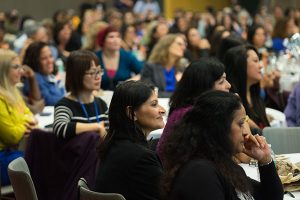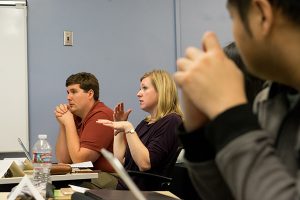As the season changes, some significant changes here at SJSU have begun to take effect as well, although they will always be mixed with the important traditions that honor our past. Most notably, this month we will be reviewing a record number of applications for the Staff Professional Development Grant; we will be announcing the first ever selected faculty for our new Research, Scholarship and Creative Activities Reassigned Time program; AND we will find time to celebrate a holiday or two.
With Thanksgiving just around the corner, I especially want to share with all of you my gratitude for the support I have received in these few months that I have served as Interim Provost and Senior VP. Thank you first and foremost to the team in the Office of the Provost, who make every day joyful; thank you to the President and her Cabinet; the AALT Leadership Team and a very heartfelt thank you to so many of the faculty and staff with whom I have had the pleasure to interact and to work beside. Taken together, this is a wonderful community that takes its humanity and its work seriously, with kindness and tact.
A few important informational items, starting with our Graduation Initiative 2025 goals. Our four-year graduation rates hit 19 percent this year, up 10 percentage points in the past five years. We continue to make substantial gains on six-year graduation rates, transfer student graduation rates and we are two percentage points away from eliminating our Pell-eligible equity gap. We also continue to move forward with eliminating the underrepresented minority equity gap, which dropped to 10.5 percent this year.
Speaking of graduation, we will be celebrating our fall graduates in just a few weeks with two days of commencement ceremonies on December 19 and 20. These ceremonies allow us to recognize the achievements of our fall graduates with the same fanfare as those who graduate in the spring ceremonies. Students LOVE to see their faculty, introduce them to friends and family, and just basically celebrate with their faculty and staff. I do hope you can be available for these occasions. As a reminder, faculty who would like to rent regalia for the ceremonies can do so for free through the Spartan Bookstore website; the deadline to rent regalia is Nov. 21.
Last month, I had the opportunity to say a special thank you to the hardworking staff members in the Academic Affairs Division at our annual Staff Appreciation Breakfast. It was heartwarming to hear each dean and AVP give thanks to the employees in their college or unit, but especially to see some of the notes of appreciation from colleague to colleague. As our breakfast was held on Halloween, I was very impressed with everyone’s ingenuity and costume design!
On the evening of Nov. 2, I had the chance to interact with honored faculty and staff at the Annual Author and Artist Awards. The dozens of pieces completed this year by SJSU authors and artists have a significant impact on the world: this work adds to knowledge in your disciplines; spurs conversations about societally important topics such as politics, technology and diversity; and provides engaging curricular opportunities for students. As we focus this year on creating more balance for our faculty members to be teacher-scholars, it is especially imperative that we also take the time to celebrate accomplishments like these at events like these.
I hope you all have a wonderful Thanksgiving break and I look forward to our continuing work together.
Sincerely,
Joan C. Ficke
Interim Provost and Senior Vice President for Academic Affairs

